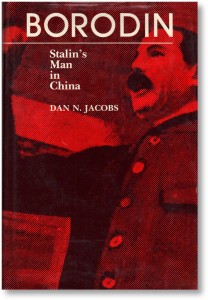
Political instability, attraction for the orient as well as the protection of extraterritoriality attracted a large number of adventurers and shady characters to Shanghai and China in the 1920’s and 1930’s. Most of them came for the adventure, the money, or fleeing from justice, but some came for political reasons. Although mostly gone from history books, Russian agent Borodin’s years in China were the high points of his life as well as of highest importance for China. I had read his name in a few history books, but it took years to find and read his full biography, 1981 Dan N. Jacobs book, “Borodin, Stalin’s man in China”.
Mikhail Gruzenberg, best known as Mikhail Markovitch Borodin, was one of the most important Cominterm agent. Born in a small village in today’s Belarus, he managed to become a central figure in Riga’s communist party, working along Lenin during the 1905 failed revolution and participating in 1903 and 1906 Stockholm party congress. There he met Stalin, creating a relationship that would influence the rest of his life.
1906 failed revolution in Russia was followed by heavy repression. Borodin chose exile over prison and ended in London, before being sent to Boston and moving to Chicago. He then attended a low tier university in Valparaiso, Indiana for a short period before coming back to Chicago. He taught English for foreigners at the Hull House, the central point for immigrants communities in Chicago. 6 months later, he opened his own school, teaching English and practical skills in the evenings, while helping spreading communists revolution in Chicago during the day. Having not forgotten about the revolution in Russia, he simply waited until the right time came. In 1918, he was back in Russia to reconnect with his old friends. Being one of the few with extensive international experience, he became a Cominterm agent, in charge of spreading the Revolution all around the World. His first main mission was helping the revolution in Mexico, where he met Indian revolutionary M.N. Roy, coming back to Moscow in 1920. His second mission undercover in England ended with his arrest by the British police, and being expelled to Russia in 1923.
As attempts to spread the revolution failed in Europe, China became one of the points of attention for Moscow. Chinese Communist party was still very small at the time, so an alliance was brought with Sun Yat-sen and his Kuomintang party. Thanks to all his international experience and command of English, Borodin was sent as an envoy to Sun Yat-sen in Guangzhou with the aim of helping him becoming again the leader of China. With his skills and promises of Soviet military help that never materialized, he managed to run the Guangzhou government from the background. Among others, he played a pivotal role in creating Whampoa Military Academy , while putting many communists agents in Kuomingtang administration. However, soviet led communist revolution in China never took place, being stopped by Chiang Kai Shek (himself a graduate of Whampoa Military Academy) in 1927. Borodin barely escaped then but had to return to USSR with a massive failure, ending his extraordinary international career. Communists only took power in China in 1949 under the leadership of Mao ZeDong, but USSR was never able to control it.
The book is an in-depth research of the life of this mostly unknown and quite shady political adventurer. As interesting to read, as hard to find.
OH. I just now realized that “Shanghailander” is supposed to be pronounced Shang Highland Er. I had been mentally pronouncing it Shanghai Land Er and it’s awkward and clumsy that way. I think this blog should do a better job publicizing this.